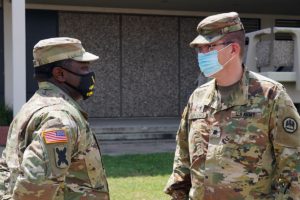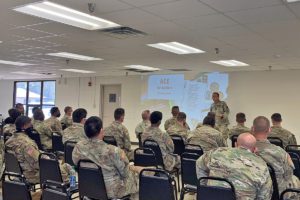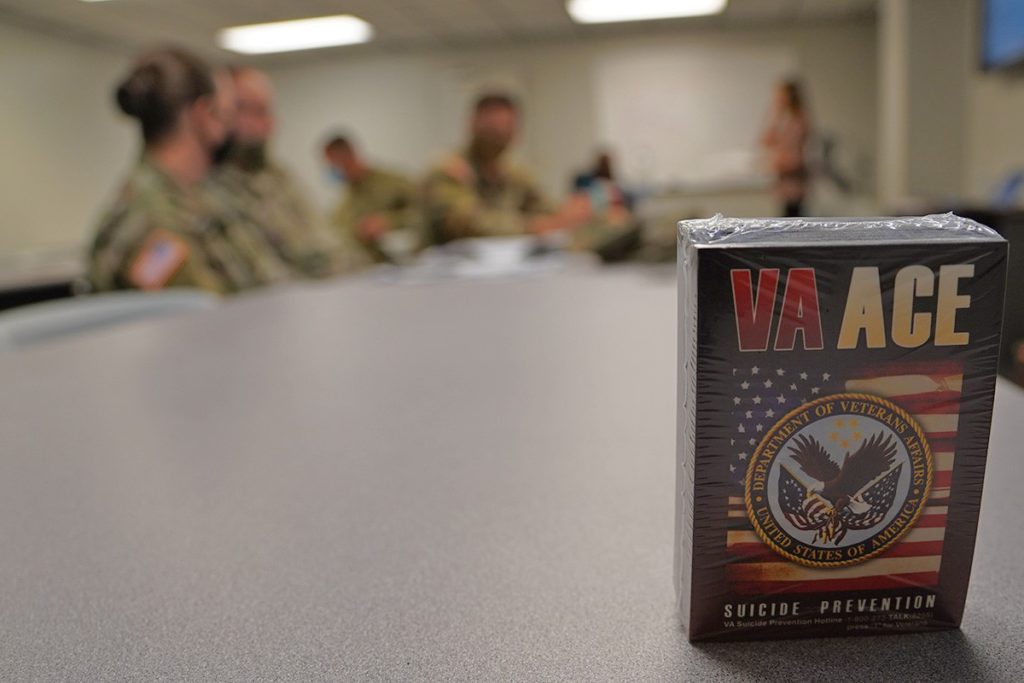La. National Guard recognizes, participates in Suicide Prevention Month
By Sgt. 1st Class Denis B. Ricou, Louisiana National Guard Public Affairs Office
BATON ROUGE, La. – Every year, the Louisiana National Guard recognizes September as Suicide Prevention Month and participates in activities and training to ensure units and leaders have the skills to recognize and intervene in potential suicide situations.
Every guardsman within the LANG participates in their respective unit’s suicide prevention activities during the month to the greatest extent feasible in order to promote continuing efforts to stop suicides within its ranks and identify resources available during a time of crisis.
 “This has been an historic year of challenges for the Louisiana National Guard, and I’m incredibly proud of how each and every soldier and airman has answered the call without fail and performed with excellence and integrity,” said Brig. Gen. Keith Waddell, adjutant general of the LANG. “At this time, it is imperative that we reach out to our teammates and check on their health, both physically and mentally.”
“This has been an historic year of challenges for the Louisiana National Guard, and I’m incredibly proud of how each and every soldier and airman has answered the call without fail and performed with excellence and integrity,” said Brig. Gen. Keith Waddell, adjutant general of the LANG. “At this time, it is imperative that we reach out to our teammates and check on their health, both physically and mentally.”
Although the LANG is actively supporting two emergency responses, COVID-19 and Hurricane Laura’s recovery operations, the relevance of this awareness and training is even more important.
“Particularly in Louisiana, the National Guard is called on regularly to help our state due to the number of natural disasters we face with floods, hurricanes, oil spills and other events. Guardsman resiliency, or the ability to ‘bounce back’ when stressed, can be difficult,” said Lt. Col. Page Brooks, state chaplain for the LANG. “Our role as chaplains to help service members be resilient is particularly significant for us. Many of our soldiers and airmen experience tragedy with these natural disasters, and are then called to turn around and serve their community in that same natural disaster.”
Brooks says he became a chaplain in 2003 due to a sense of duty following the events of 9/11. “I wanted to serve the country but also serve God as well. The National Guard chaplaincy provided a way for me to serve locally at both a local and national level.”
“While any number of suicides is too high, the National Guard is making great efforts to provide help and hope to soldiers and airmen,” said Brooks. “All of our chaplains are trained in suicide intervention, and we work hand in hand with our partners in behavioral health, suicide prevention and family programs to offer hope.”
In 2010, the national suicide rate in the Army National Guard exceeded 100 suicides, an indication of the many challenges and stressors that serving as a guardsman can pose. The Resilience, Risk Reduction, and Suicide Prevention (R3SP) Campaign Plan was then established and became the core framework that leaders would implement as a solution to promote resilience, develop and enhance leaders skills to mitigate high stress factors, and facilitate long-term reduction in at-risk behaviors and suicidal actions.
“The intent is to provide a holistic program that builds the resilience and enhances the performance of service members and their families,” said Amber Sayer, R3SP program coordinator for the LANG. “This effort is completed by targeting the five dimensions of Emotional, Social, Family, Spiritual and Physical.”
The LANG R3SP Program’s mission is to increase the resiliency of the force in an effort to decrease the rate of suicide. By providing resource education, resilience, awareness and crisis intervention skills training, they motivate service members and their families to maintain overall wellness through the enhancement of life skills.
Once a service member is identified as needing help, they are referred to the behavioral health office for counseling or treatment.
“I am often asked ‘how can we decrease our state’s suicide rate?’” said Maj. Angela Huval, the state behavioral health officer for the LANG. “Having worked in  this role for over 11 years, I have found that one effective approach to decrease suicides is early intervention starting at the unit level.”
this role for over 11 years, I have found that one effective approach to decrease suicides is early intervention starting at the unit level.”
To date, the LANG’s R3SP programs have successfully trained, at the unit level, 927 soldiers in Applied Suicide Intervention Skills Training (ASIST), appointed 86 unit Suicide Intervention Officers who have trained 2,866 Soldiers in annual ACE awareness training, and certified 141 Master Resilience Trainers.
“The LANG began experiencing a decrease in suicide starting in 2015, however we have lost a total of three Soldiers this fiscal year. We are hopeful that we can continue to produce a downward trend of suicide activity, but we need everyone’s help. I encourage everyone to take the time to educate themselves about suicide prevention in order to learn more about the stressors that can lead to thoughts of suicide, the warning signs of when someone may be experiencing these thoughts and how to get them connected to the appropriate resource,” said Sayer.
At all levels, leaders agree that communication is key in promoting awareness and prevention.
“Connecting with soldiers during the week day simply by making a quick phone call or text can be a way to keep a soldier engaged with their military family while not in uniform,” says Huval. “Reaching out to a comrade can help combat isolation, a dangerous factor when soldiers are feeling hopeless.”
“One conversation can save a life … we just have to be willing, ready and able to start it,” said Sayer.
The LANG program managers are available to provide training opportunities in resilience, suicide prevention and intervention and connect service members and their families with resources. They can be contacted by submitting a “contact us” form at www.geauxguard.la.gov/r3sp or by visiting the Facebook page at www.facebook.com/langr3sp.
“Remember the 3 P’s: be positive, be proactive and be problem-solving,” says Waddell. “Listen to your teammates, be excellent every day and protect what matters!”






